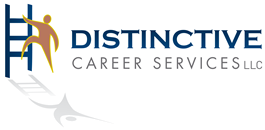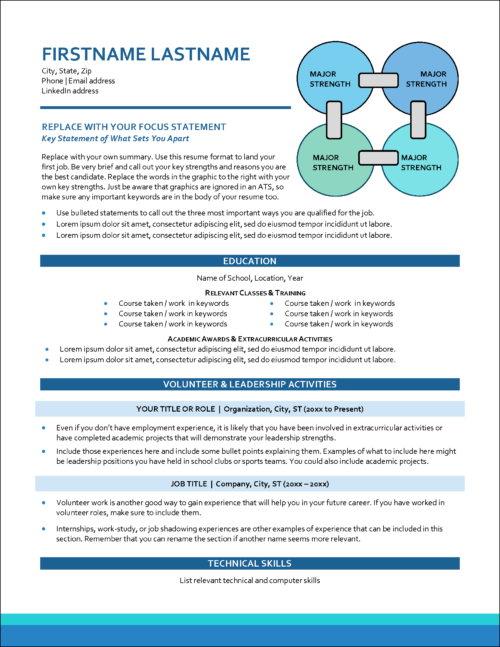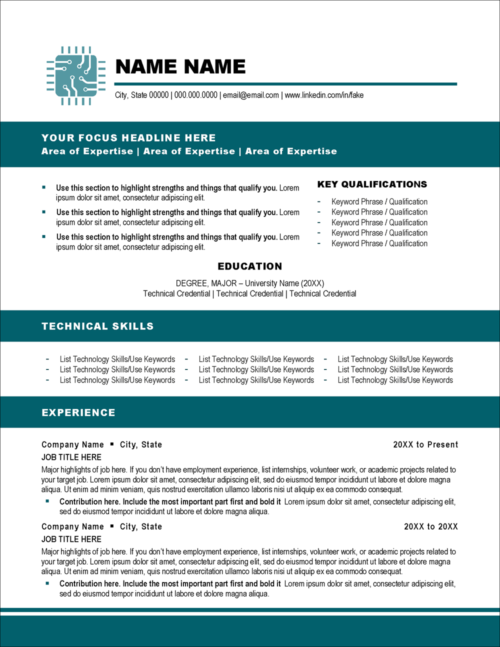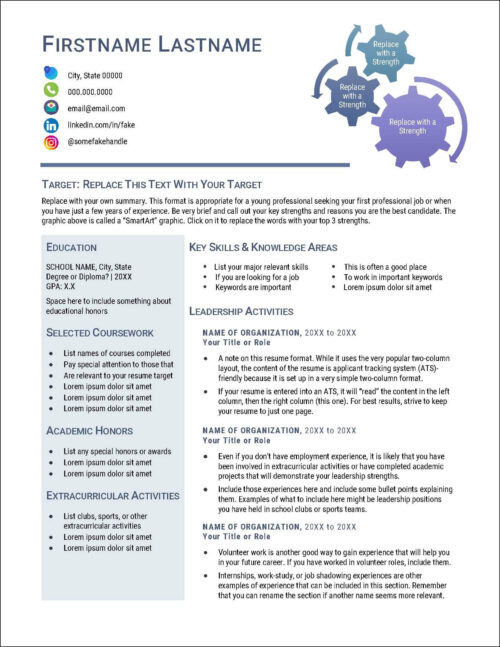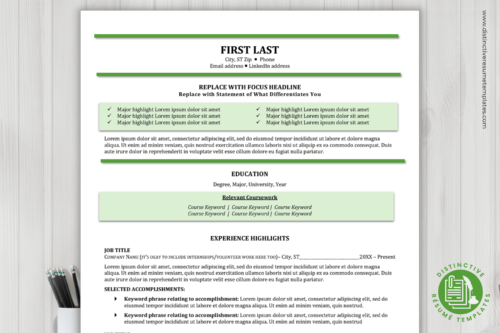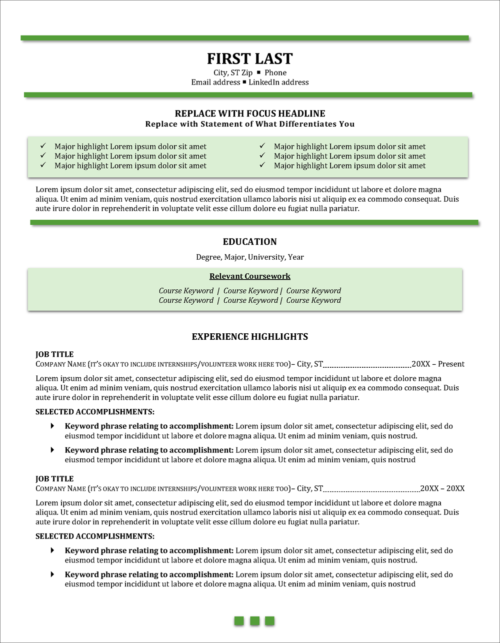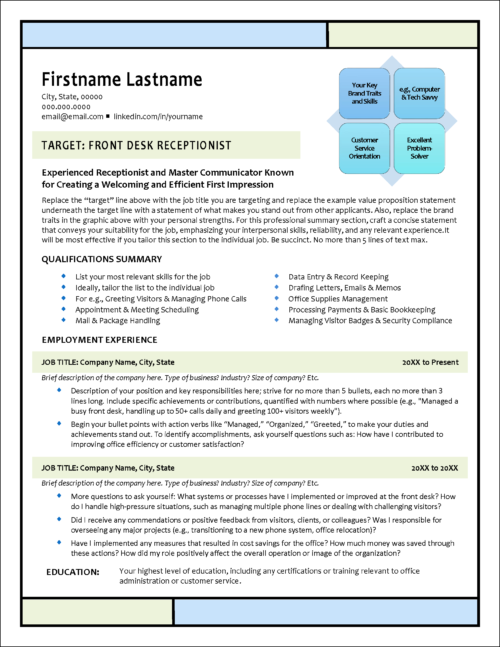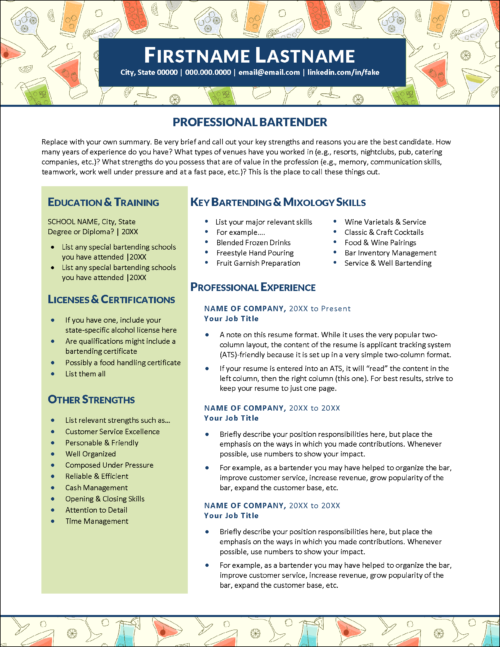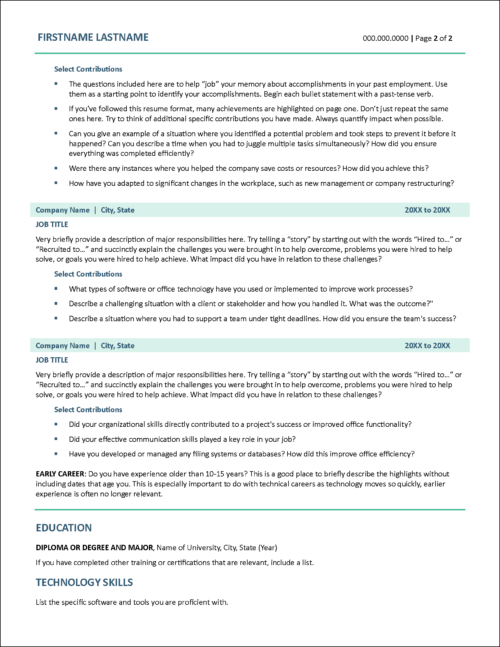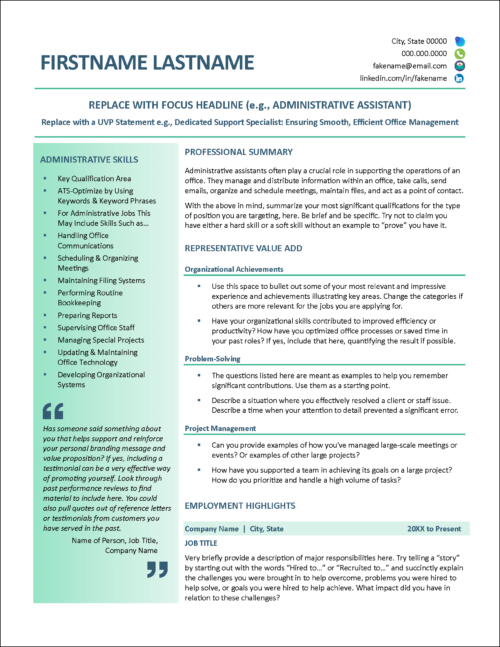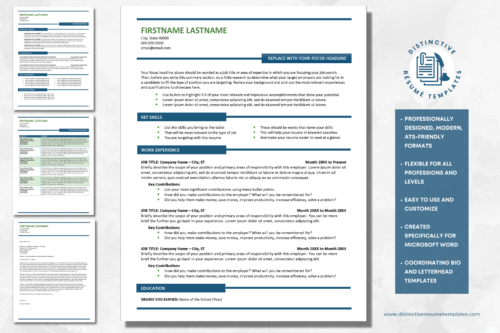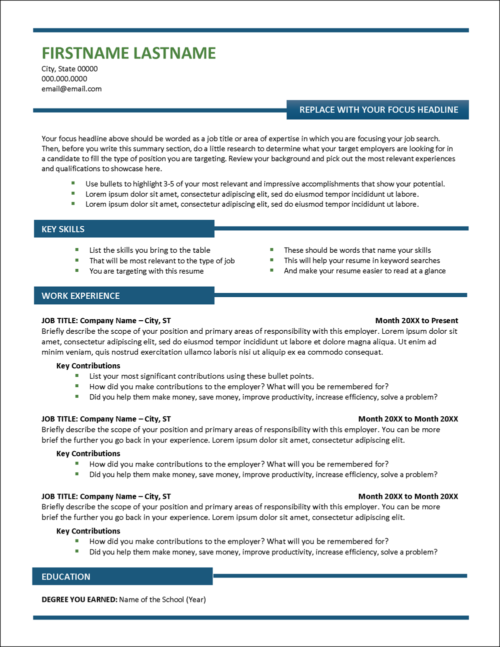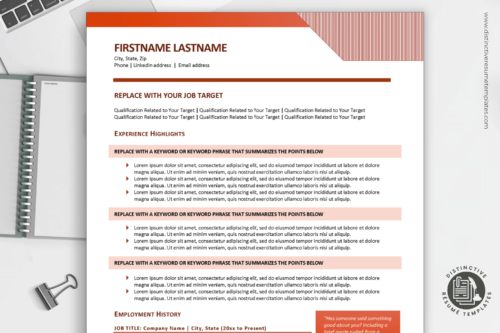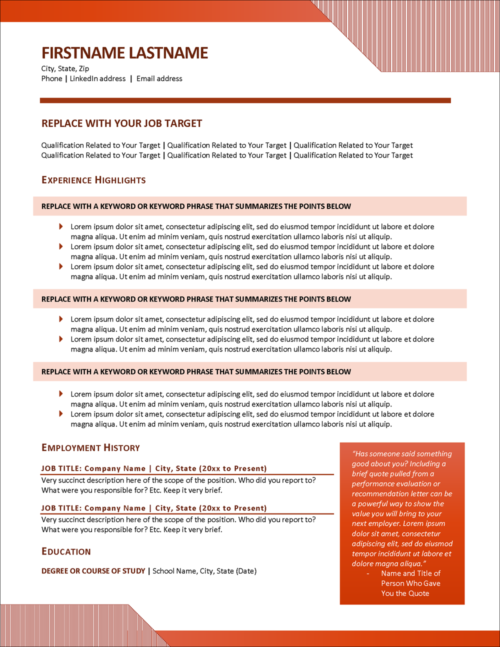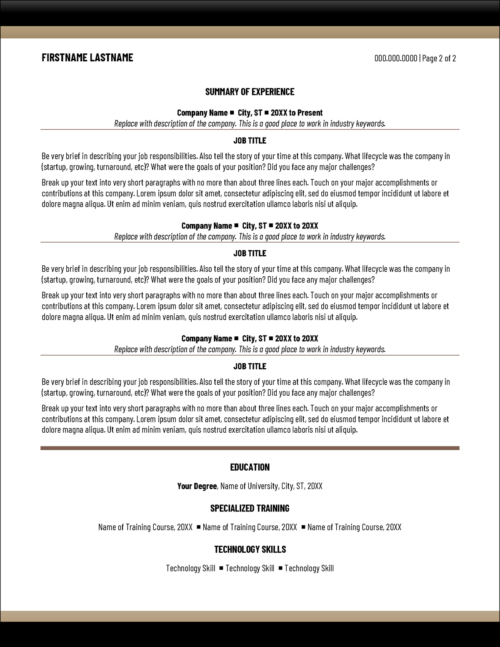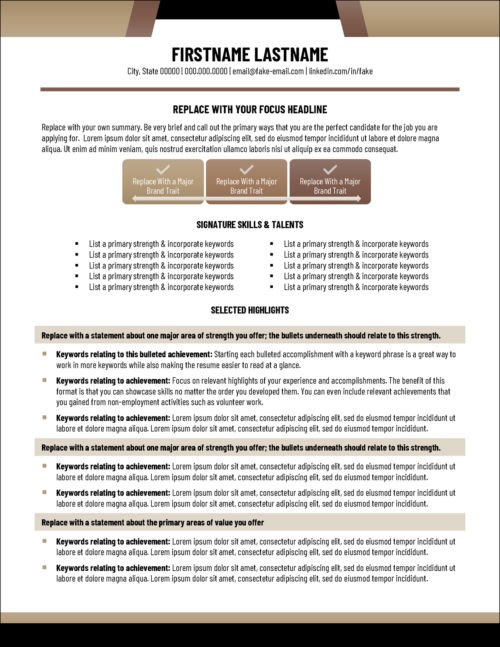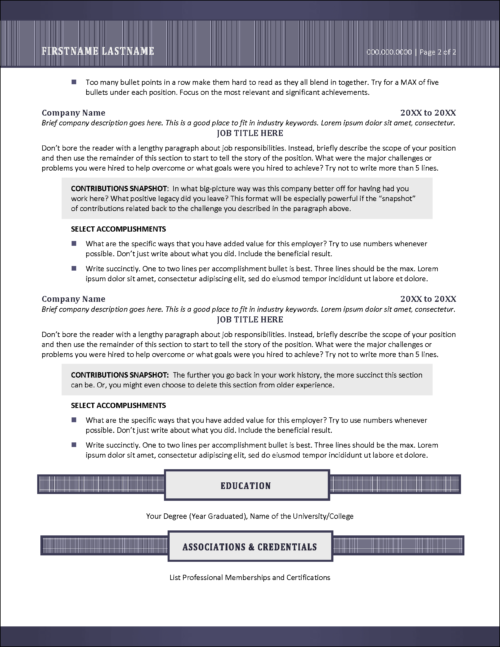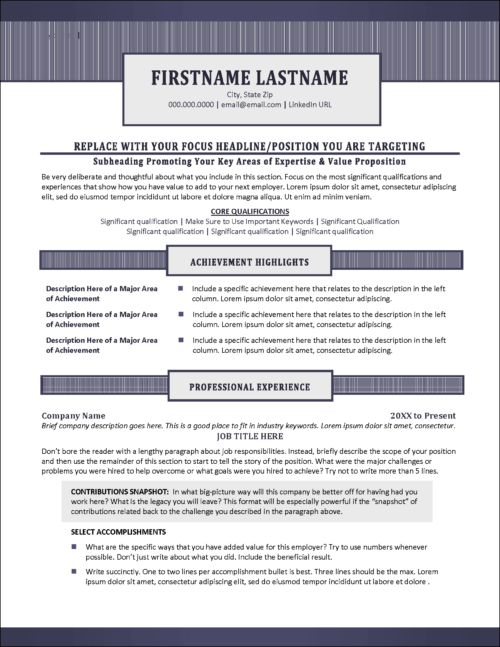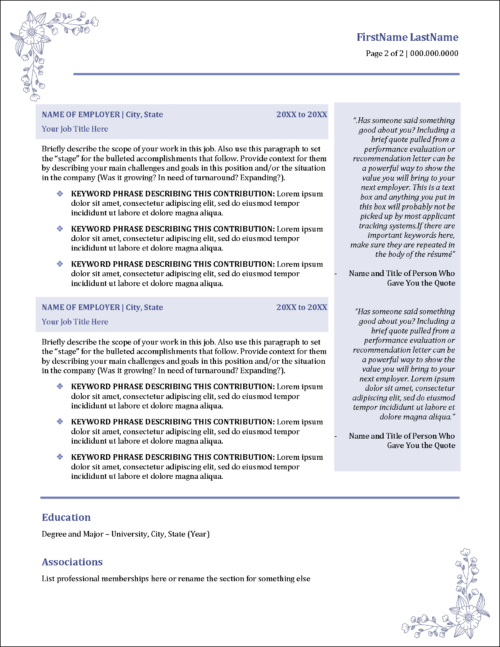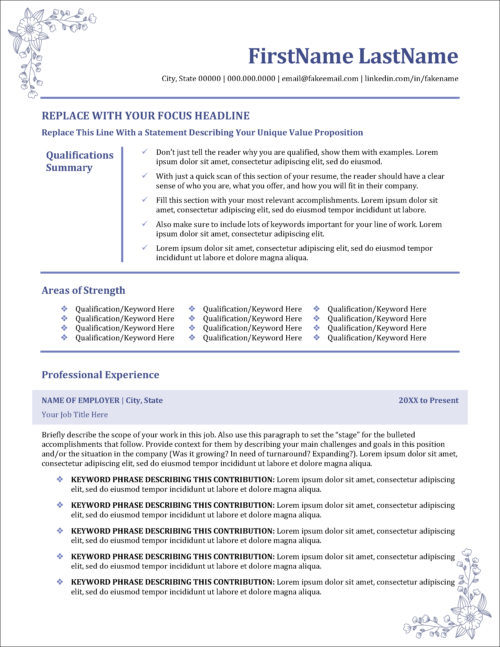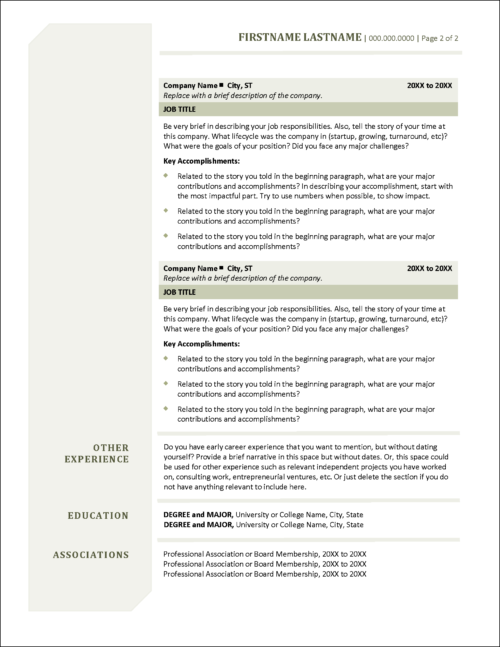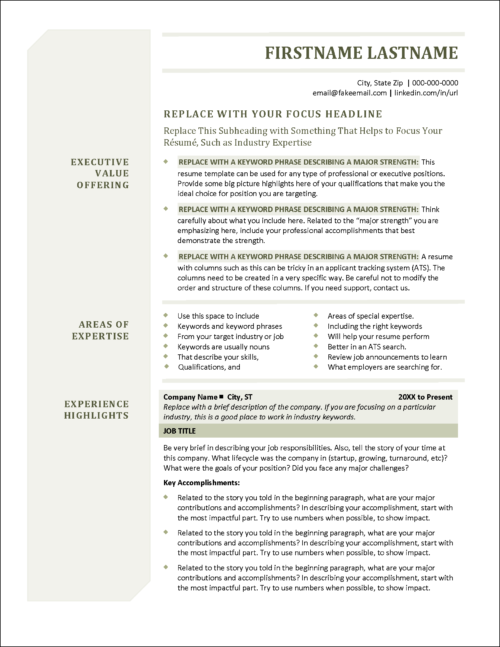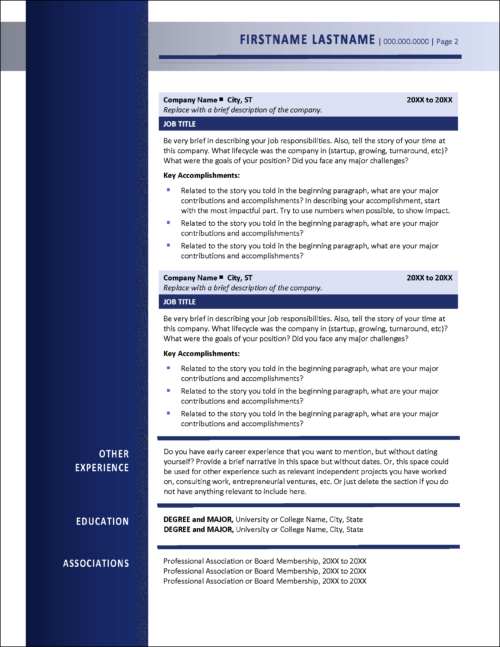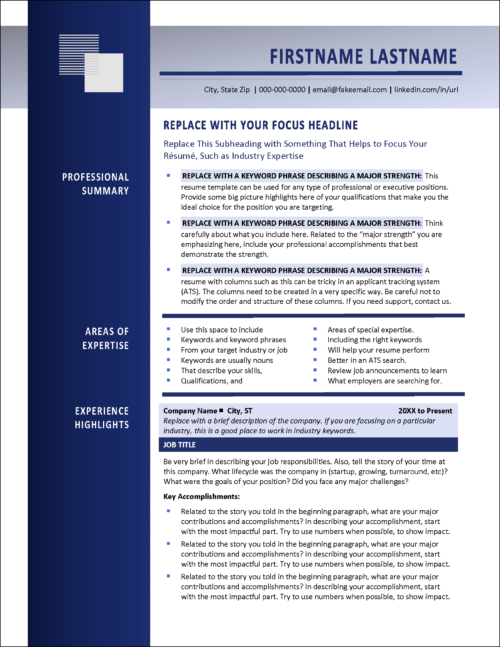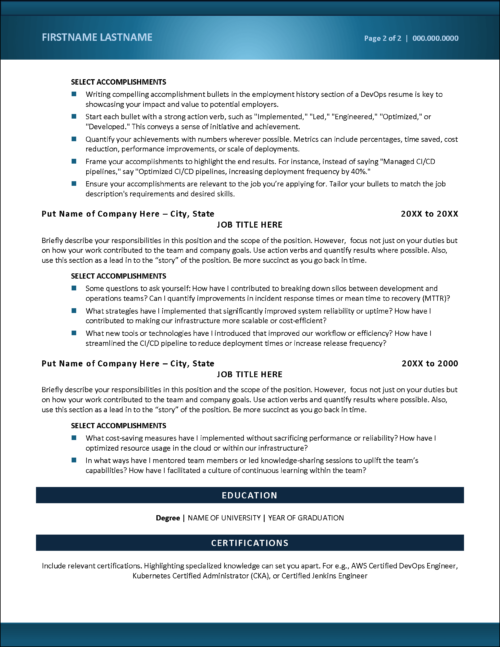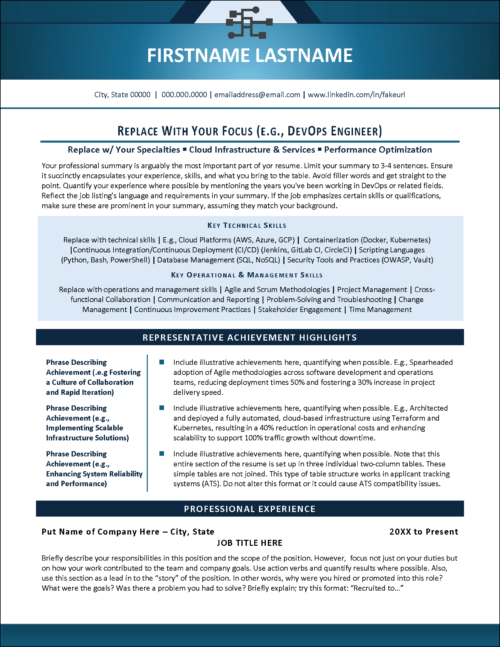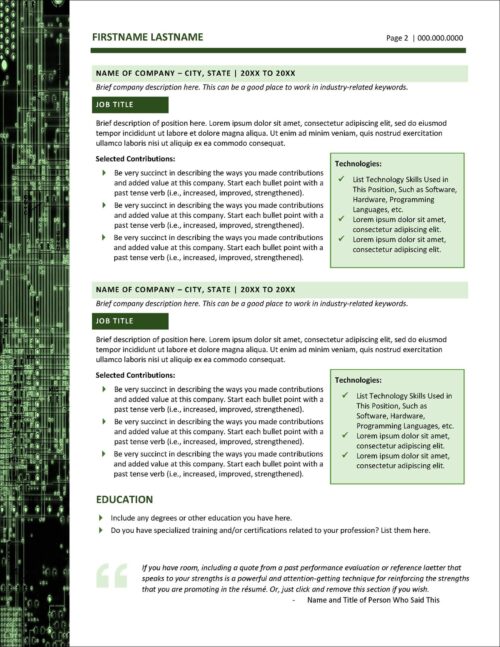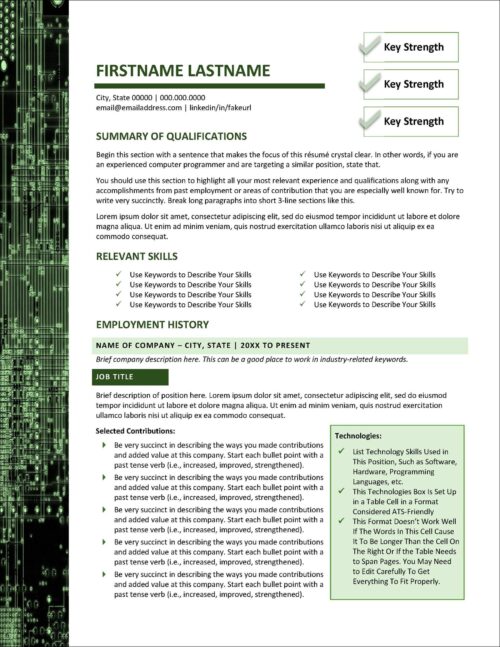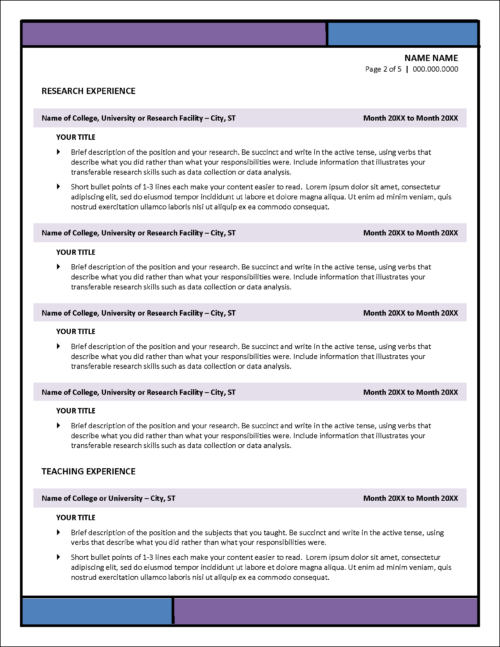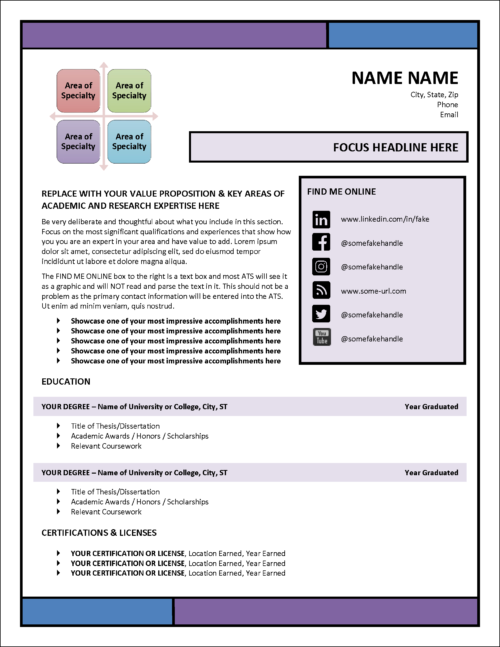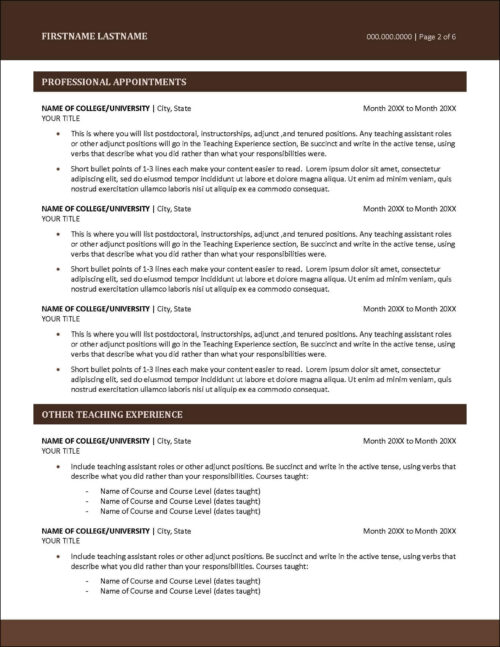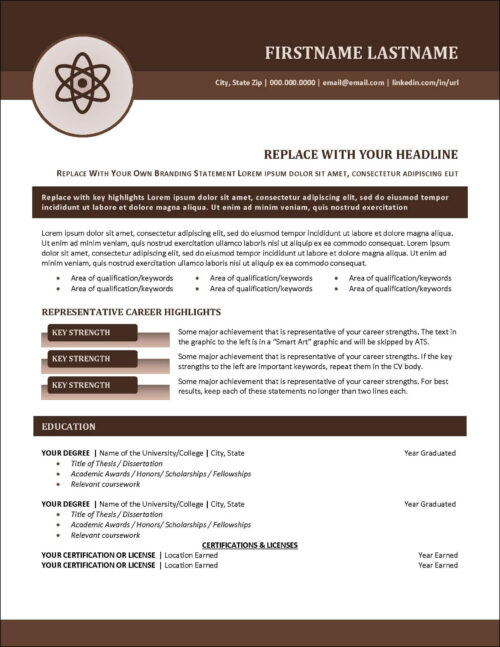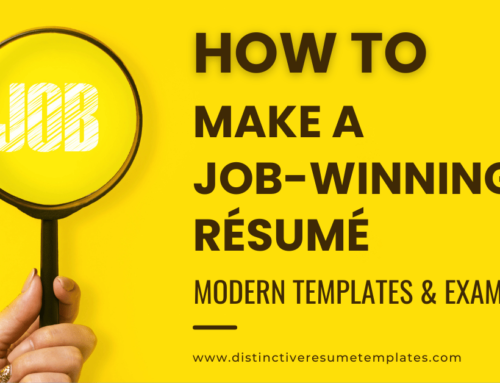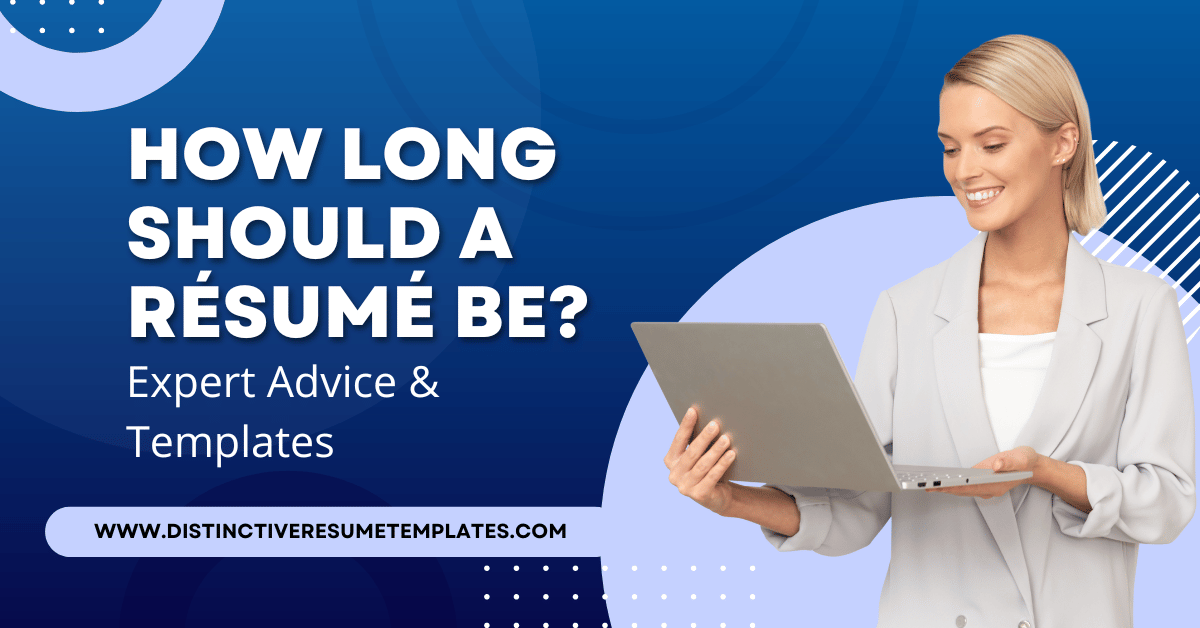
If you’re asking ‘how long should a resume be,’ you’re probably hoping to find some easy-to-follow rule that tells you exactly what to do with your resume. After all, the goal is to ensure that your qualifications are effectively showcased without overwhelming the reader.
Unfortunately, it isn’t quite that clear-cut. The answer isn’t one-size-fits-all, but it varies depending on your experience, industry, and the role you’re targeting. This article dives into how to tailor your resume length to fit your background, with resume tips and advice for new grads through to executives and specific industries.
Key Takeaways
Determining the Perfect Resume Length
Does a perfect resume length exist? It’s like looking for a unicorn in a forest of career advice. You’ll find a ton of conflicting and outdated tips on the internet. Some swear by the one-page rule, while others argue that your resume can be as long as a Tolstoy novel. But here’s the truth: the ideal length for your resume depends on various factors like your experience level, the industry you’re in, and the specific job you’re applying for. So, it’s more about hitting the right notes and making the most of precious resume real estate than adhering to rigid rules.
Think of it like baking a cake. You need the right ingredients in the right proportions. Too much flour and your cake is dry. Too little, and it’s a gooey mess. Similarly, your resume should have just the right amount of information – not too little that it’s incomplete, but not too much that it’s overwhelming. Remember, your resume is your personal marketing tool to win interviews for the jobs you want, and you want to keep your audience engaged, so they pick up the phone and call you, not bore them to tears.
Of course, most job seekers would benefit from working with a certified professional resume writer to ensure your resume stands out and effectively highlights your expertise. A professional resume writer will be able to give you expert advice specific to your individual situation. But if you are determined to go it alone, do so armed with the following guidelines, along with your favorite resume template from our portfolio of professionally designed templates.
Experience Level
First things first, let’s talk about your experience level. If you’re fresh out of college or just starting in the professional world, a one-page resume should be your go-to. At this stage, your resume should emphasize your academic achievements, including degrees and certifications. You want to focus on the relevant skills and academic accomplishments that make you an appealing candidate. A single-page resume typically allows for this while also leaving page space for other potentially relevant details such as volunteer work, internships, or one or two positions of seasonal employment.
However, as you gain more experience, your resume will naturally grow. As a general rule of thumb, if you have more than five years of experience, a two-pages might be justified. But here’s a pro tip: if you’ve expanded your resume and find that your second page is less than half-filled, consider editing your content to fit back into one page. An incomplete second page can give the subtle impression of inadequate experience or qualifications, or it may appear as though you are unable to organize and condense your professional history effectively.
Industry Standards
Now, let’s take a detour and delve into industry standards. The answer to the ‘how long should a resume be’ question can be influenced by your field of work. If you work in research, healthcare, academia, IT, or any technical field, a resume with two pages might be more beneficial, even as a new graduate. These fields often require detailed descriptions of projects, certifications, and research, which might not fit into a single page.
However, if your resume stretches beyond two pages, it’s usually for individuals with extensive research experience who need to list their numerous publications and citations. In such cases, a CV format may be recommended, which can be much longer than your standard resume.
Job Requirements
Finally, let’s touch on job requirements. Your resume should be a mirror that reflects the specific skills and experiences required for the job. It should demonstrate how your past work experiences align precisely with the job advertisement’s stated needs.
To ensure your resume doesn’t end up in the dreaded ‘no’ pile, pay close attention to the language used in the job description. Incorporate relevant keywords into your resume to increase its chances of passing through Applicant Tracking Systems (ATS), which pre-screen resumes for relevant skills and qualifications.
One-Page Resumes: When to Keep It Short
Alright, let’s switch gears and talk about one-page resumes. They’re the haiku of the job application process—concise, structured, and artfully conveying your professional narrative within a limited space. If you are an entry-level candidate, recent college graduate, high school student, or career changer, this is your moment to shine! A single-page resume is often ideal for you, as it allows for a concise and focused presentation of relevant skills and academic achievements.
But wait, there’s more! A one-page resume can also be a good choice for some administrative jobs, frontline service jobs, and blue-collar professions. It’s all about showcasing your specific skills and certifications rather than a lengthy educational background or extensive professional chronology. So, don’t fret if your resume doesn’t feel like a Tolkien novel; sometimes, less is more.
Resume Length Tips for Entry-Level Candidates and Recent Graduates
As an entry-level candidate or recent graduate, you might sometimes feel like you’re standing in front of a buffet with a surprisingly small plate. The challenge isn’t about having too much to include; rather, it’s about figuring out how to fill that plate with what you have—making sure each item is nutritious and appealing. You may worry that your experiences and achievements seem too sparse or not directly relevant.
However, the key lies in how you present these elements. Focus on articulating your skills and knowledge, educational achievements, internships, volunteer work, and any projects with precision and impact. This strategy ensures you craft a compelling narrative that highlights your potential and readiness for the professional world, turning your one-page resume into a powerful tool that captures the attention of potential employers.
Remember, your resume should encompass the following sections:
- 1
Contact information
- 2
Professional summary
- 3
Relevant experience (which doesn’t necessarily mean “paid” employment experience)
- 4
Education
- 5
Relevant skills
Also, highlight internships, volunteer service or on-campus activities if you have limited relevant work experience. It’s all about putting your best foot forward!
Distinctive Resume Templates offers many one-page resume templates for students and other entry-level workers, such as the following examples. It is as simple as choosing and downloading your favorite one, then entering your resume content as prompted in the template.
The Ideal Resume Length for Blue Collar & Front-Line Service Job Seekers
For blue-collar job seekers, a one-page resume can often be your best friend during your job search. Recruiters for blue-collar fields typically prioritize quick and efficient assessments of candidates’ skills and experience, and a concise resume makes it easier for them to evaluate your suitability for a position.
Remember, blue-collar positions often require specific skills or certifications rather than lengthy educational backgrounds or extensive professional experiences. Highlighting these specific skills and certifications on a single-page resume can be more effective as it allows you to draw attention to these qualifications clearly and concisely.
This is particularly effective for tradespeople, like electricians or plumbers, or for some administrative jobs, such as a receptionist or data-entry associate, or also for service frontline jobs, such as a retail sales associate, cashier, or restaurant server, where specific skills and technical knowledge are more critical than a detailed professional history.
The following are examples of our many resume templates for tradespeople, administrative professionals, and frontline workers.
Resume Length Tips for Career Changers
Now, let’s talk about career changers. If you’re venturing into a new career path, a one-page resume can be your guiding star. While there are times when a two-page resume is more appropriate for career changers, a one-page format will force you to focus on transferable skills and relevant experiences while avoiding the temptation of including past job roles that do not pertain to your new career path. Non-relevant experience can dilute the impact and clarity of your resume.
Given that hiring managers often have limited time to review each application, the brevity of a one-page resume ensures that their attention remains on your potential and the future contributions you can make, rather than dwelling on a past that's not aligned with your new career path. So, keep it concise, focused, and tailored to your career goals.
To effectively highlight your readiness and suitability for a major career change, consider using a functional or combination resume layout. This strategy allows you to lead with your most relevant qualifications—be it skills, projects, or pertinent coursework—before delving into your employment history.
In essence, a one-page resume for career changers is not just about keeping it short; it's about crafting a focused narrative that aligns with your new career objectives. By carefully selecting which experiences and skills to feature, you make a compelling case for your transition, ensuring that every word on the page advances your goal of stepping into a new professional arena.
While many of our resume templates designed for career changers are two-page templates, they can be easily shortened to one-page resumes to meet all needs.
Two-Page Resumes: The Standard?
As we turn our focus to two-page resumes, we’re entering the territory of mid-career and experienced professionals, as well as those in technical professions. A two-page resume has become more accepted as the norm in many professional fields.
But remember, every word on your resume should serve a purpose. If the content doesn’t add value or isn’t relevant to the recipient, it doesn’t belong there. The value of the content itself should drive the decision to extend to a second page. Try to aim for the second page to be at least half-filled (and three-quarters is better). This will maintain a balance between providing comprehensive information and keeping the document aesthetically pleasing and engaging.
The Ideal Resume Length for Mid-Career and Experienced Professionals
Mid-career and experienced professionals, you’re up! By the time you've been working in a professional job for five years or more, you’ve accumulated a significant amount of relevant experience, skills, and achievements.
A two-page resume provides the space for you to detail these accomplishments, including explanations of how you contributed to your employer's success and quantifiable results of your work. This level of detail allows you to showcase a more comprehensive view of your professional journey and can significantly strengthen your job application, especially for high-stakes roles that require proven leadership and strategic vision.
You can afford to include more detail on your resume, while still keeping it concise and focused. Another benefit is that a two-page format offers more flexibility to tailor your resume for specific job applications. With two pages of content to work with, you can adjust your resume to highlight the most relevant experiences and achievements for each role, ensuring that your application is as compelling as possible.
Technical Professions
For individuals in technical fields, such as engineering, IT, and other science roles, a two-page resume might also be the perfect fit. These fields often require detailed descriptions of:
It’s all about showcasing your skills and experiences that make you the best candidate for the job and a longer format gives you flexibility in doing this.
Three-Page Resumes: Exceptions and Special Cases
Now, let’s venture into the land less traveled - a resume that extends to three pages. These are the unicorns of the resume world, rare but not unheard of. They’re best suited for highly technical roles, executive-level positions, and academics, scientists, and researchers in specific cases.
However, don’t rush to expand your resume to three pages just because you can. Remember, relevance is key here. You don’t want to overwhelm the hiring manager with information that isn’t pertinent to the job role. So, let’s delve into when a resume with three pages might be justified.
Highly Technical Roles
If you are a professional working in a highly technical or specialized field, such as advanced engineering, scientific research, or specialized IT roles, you might require more space to detail your projects, technologies you’ve mastered, patents, and specific achievements.
More than two pages is typically advised against for most job applications due to the preference of hiring managers for conciseness. However, there are unique situations when you might find three-pages to be the best choice to cover your qualifications, experiences, and achievements comprehensively. A three-page resume can provide the room needed to adequately describe complex projects and your role in them.
For the same reason, a resume longer than two pages can also be suitable for professionals with extensive lists of consulting gigs. So, if you’re in a technical field with extensive lists of relevant skills, projects, and achievements, don’t shy away from going beyond the two-page limit. Just make sure that every word on your resume adds value and is relevant to the job role.
Executive-Level Positions
For those vying for executive-level positions, such as CEO, CFO, CTO, or other C-suite roles, a three-page resume might be the best fit. These roles often require:
So, if you’re applying for a high-stakes role that requires proven leadership and strategic vision, don’t hesitate to opt for a three-page resume if you feel you really need it. Just make sure that every word on your resume adds value and showcases the skills and experiences that make you the best candidate for the job.
Academics, Scientists, and Researchers
If you’re an academic, scientist, physician, or researcher, you might need a longer resume or even a CV (for more information about the difference between a resume vs a CV, check out this article) to list:
Remember, your resume should provide a comprehensive picture of your contributions to your field, your scholarly productivity, and your potential for securing funding. To allow for this level of detail, you may need to use a longer resume format, or in some cases, opt for an even longer CV format.
The following is an example of our downloadable CV templates.
Resume Addendums: The Best of Both Options?
Feeling torn between a two-page and a three-page resume? Or, have you crafted a longer resume, still have more relevant details to list, and are contemplating a third or fourth page? Why not consider a resume addendum? It’s like the bridge that connects the best of both worlds, allowing you to maintain a succinct resume while ensuring that all relevant information is accessible to potential employers.
An addendum serves as an extension of the resume, letting you include additional details that don’t fit within the concise format of the main document. You can bring the addendum to the interview rather than submitting it along with the resume application. This approach keeps the resume concise while indicating to the hiring manager that more detailed information is available.
You can use the addendum to:
So, you can have your cake and eat it too! For more information on resume addendums and how to use them, check out this article. The following are examples of resume addendum templates that are bundled in some of our template collections.
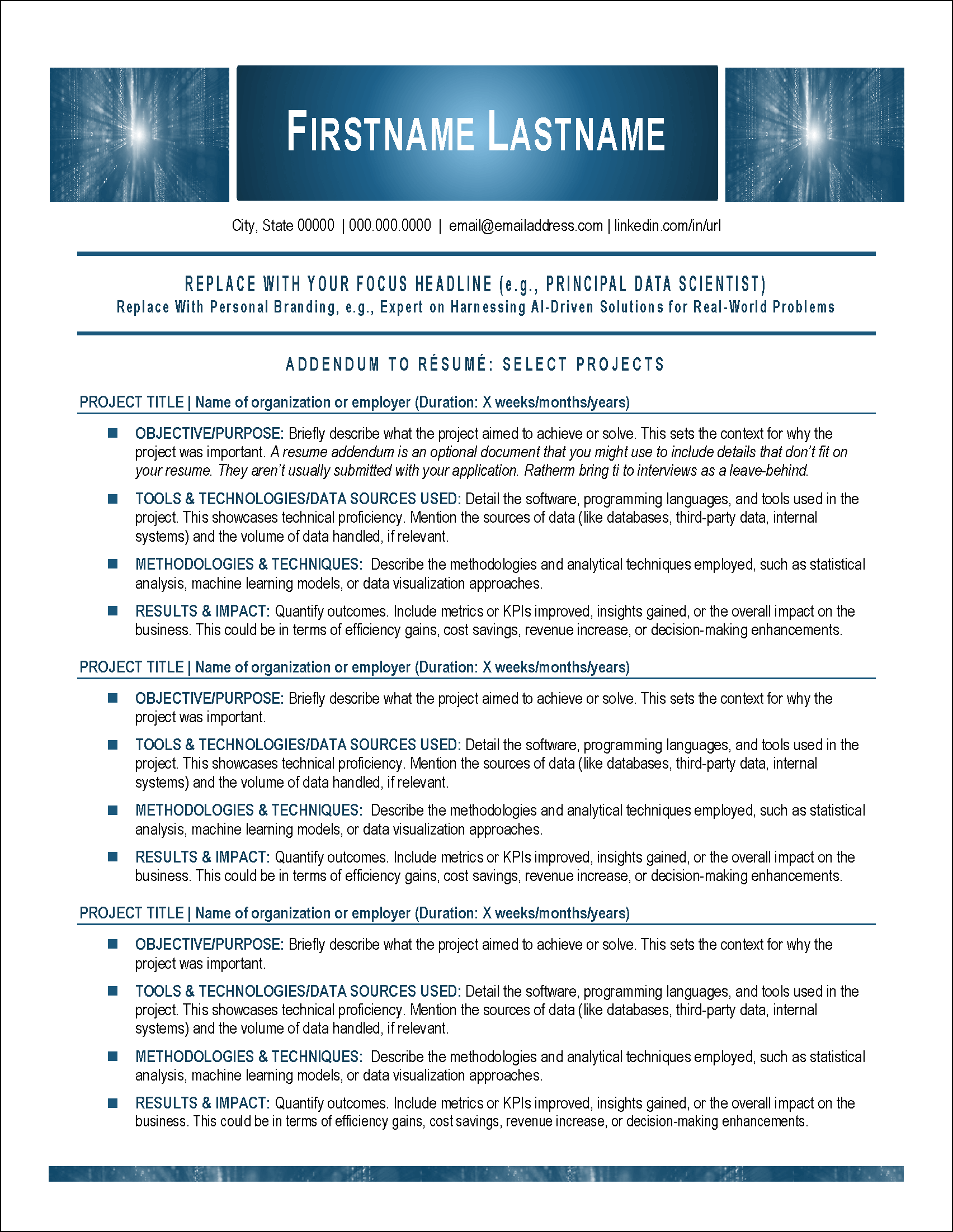
To accompany our Data Driven Resume for Data Scientists, this resume addendum (part of the coordinating templates bundle) provides a format for detailing technical projects.
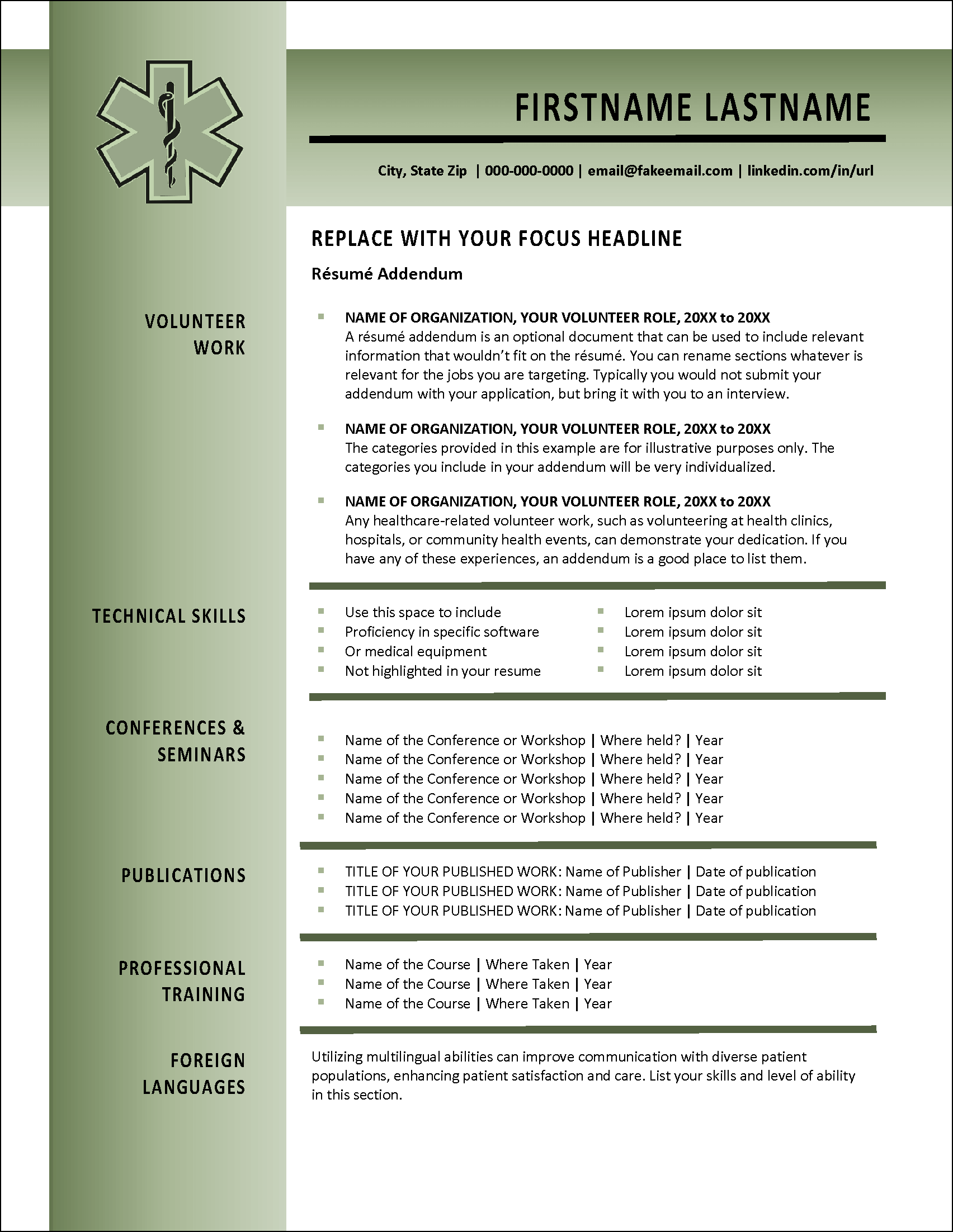
Coordinating with the the medical assistant resume in the HealthBridge Collection, this addendum provides space for volunteer work and more.
LinkedIn as a Comprehensive Career Portfolio
In the digital age, LinkedIn is more than just a networking platform; it’s your comprehensive career portfolio. It offers a place where you can elaborate on your experiences, skills, and achievements beyond the constraints of a traditional resume format.
Using LinkedIn as a comprehensive career portfolio is an excellent strategy for maintaining a succinct resume while still providing potential employers with access to a detailed overview of your career.
LinkedIn profiles can include multimedia elements such as:
It provides a richer, more engaging presentation of your professional achievements than a traditional resume. Plus, you can update your LinkedIn profile in real-time to reflect new skills, certifications, projects, and job roles as you progress in your career.
By linking your LinkedIn profile on your resume, you can:
Make sure to include a link to your LinkedIn profile on your resume, inviting potential employers to explore your profile for a more detailed view of your professional background. This approach allows your resume to serve as a high-level summary while leveraging LinkedIn for depth and detail.
The Networking Resume: A Sleek Alternative to a Longer Resume
Are you caught in the dilemma of choosing between a detailed multi-page resume and the need for brevity? Or perhaps you've managed to distill your extensive experience into two pages but find certain networking situations call for even more conciseness? Enter the networking resume—a streamlined, one-page powerhouse designed for just these occasions.
The networking resume is a strategic tool, offering a high-level snapshot of your professional journey, tailored for networking events, quick meetings, or any scenario where a brief introduction is more appropriate than a deep dive.
It's about making a strong, immediate impression, focusing on your pinnacle achievements and unique value proposition, without the detailed history found in your longer resume.
In networking contexts, this short resume format allows you to:
So, while your comprehensive resume details the full scope of your professional life, your networking resume serves as a teaser, inviting deeper engagement. It's an approach that lets you navigate both worlds effectively, ensuring you're always ready to present yourself in the best light, no matter the context.
Many of the Distinctive Resume Templates collections includes a networking resume template within the bundle of optional documents. The following are a couple of examples:
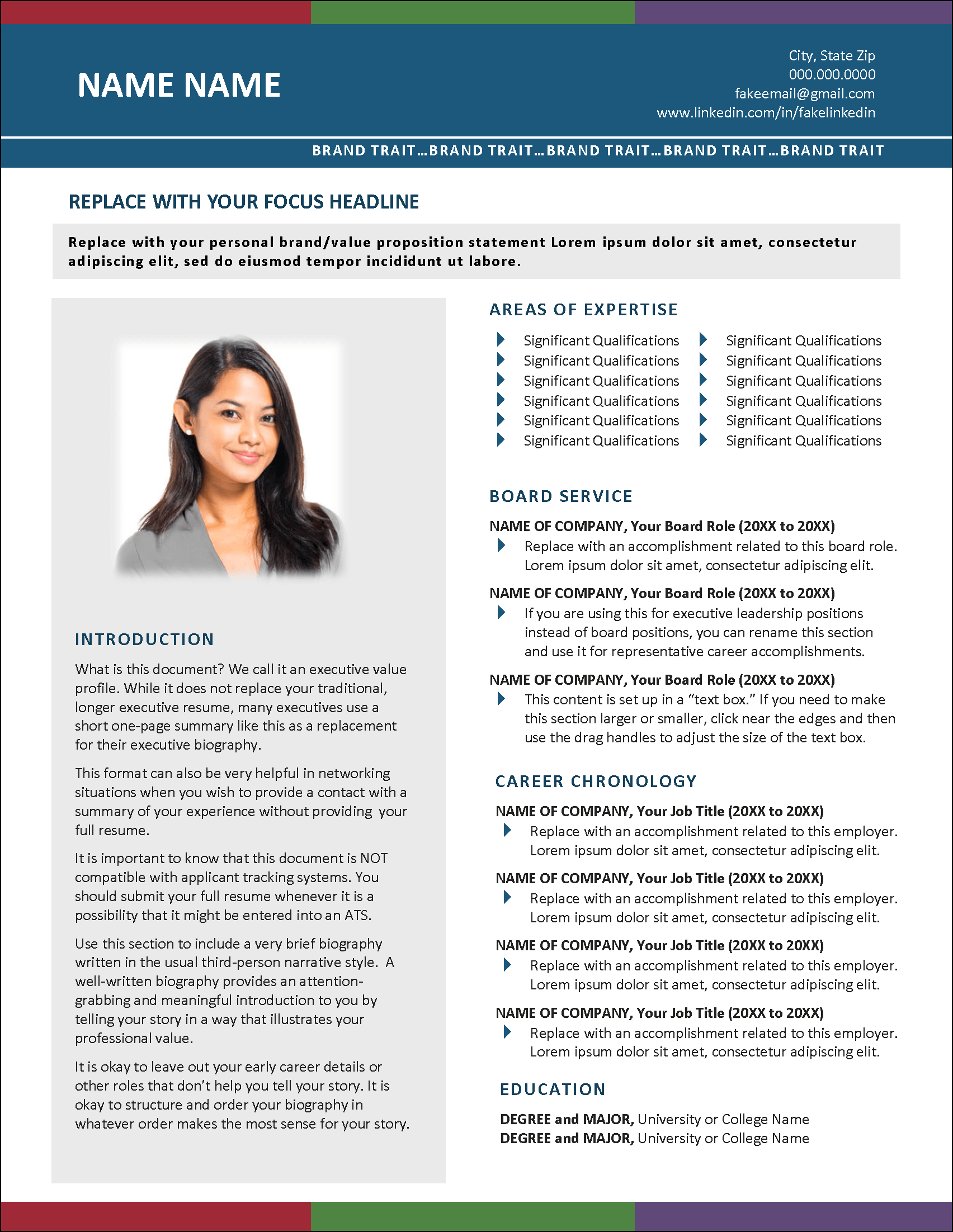
Coordinating with the vibrant resume template, this networking resume is part of the Career Pulse Coordinating Templates Bundle.
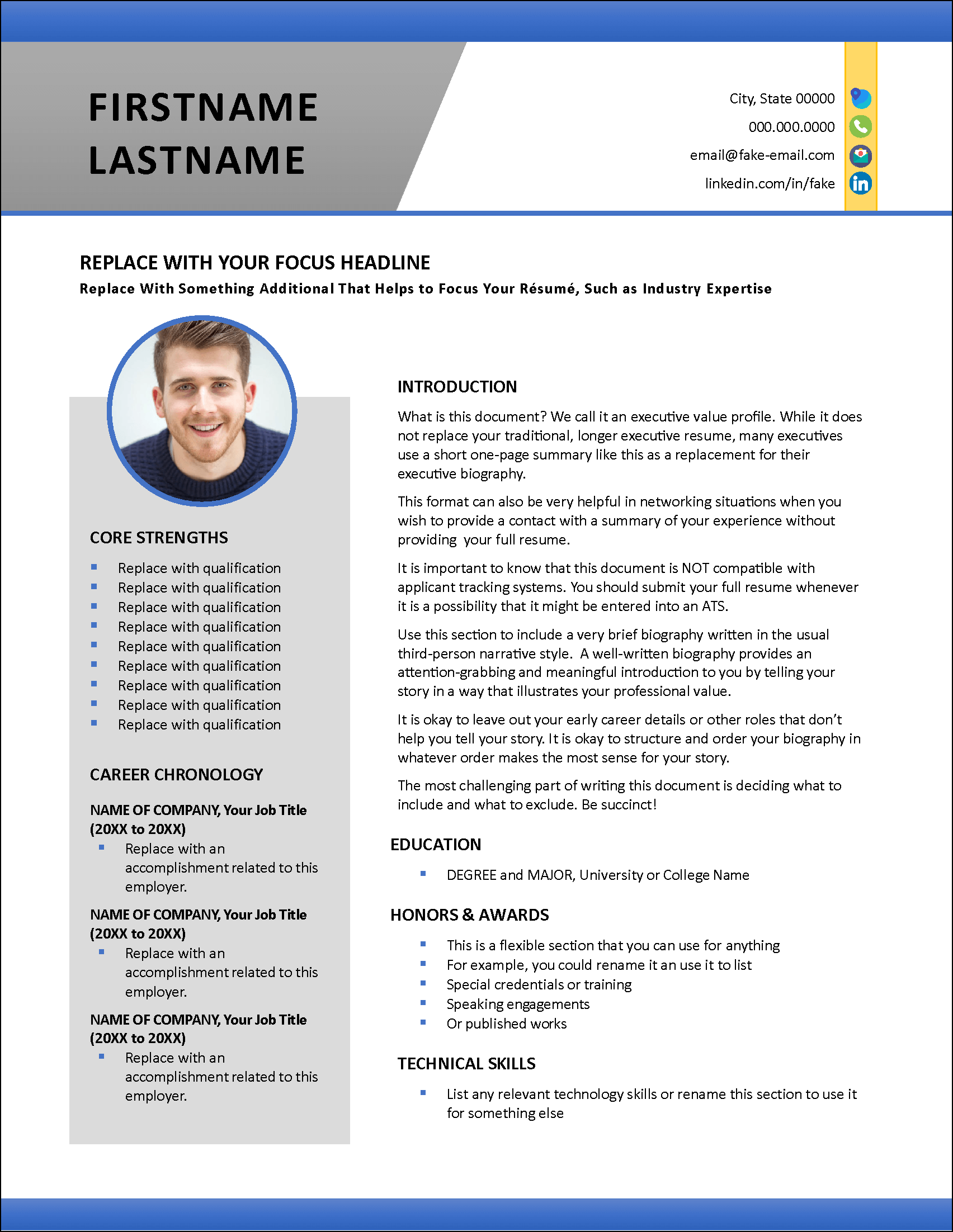
Designed to complement the HireHorizon manager resume template, this networking resume is part of the coordinating templates bundle.
Tips for Achieving the Ideal Resume Length
So, how do you strike the right balance and achieve the perfect resume length? It’s all about prioritizing relevance over length and tailoring your resume based on the job description.
Your resume should be as long as it needs to be--and no longer than it needs to be--to convey the most essential qualifications and achievements relevant to the job you’re targeting.
To help you with this, give careful thought to reach and every detail, right down to the individual words in your resume, and ask yourself if each 1) serves a purpose in your resume and 2) will be relevant to the recipient and add to your competitiveness as a candidate.
Prioritizing Relevant Content
When crafting your resume, remember that it should be a mirror that reflects the specific skills and experiences required for the job.
So, keep it focused on your most essential qualifications and achievements based on the job for which you are applying. Remove earlier work history that is no longer relevant.
Customize your resume for each job posting by identifying and emphasizing keywords and phrases from the job title and description. This will increase the chances that your resume aligns with what employers are seeking for a specific role.
If the role demands a wide range of skills and experiences, submitting a comprehensive two-page resume might be justified.
Formatting Considerations
When it comes to formatting your resume, it’s all about balance.
When crafting a resume, the goal is to convey your professional narrative in a way that is both comprehensive and easy to read. The challenge often lies in balancing content with presentation. A dense, cluttered resume can deter readers, while a well-formatted resume invites engagement.
Using sans serif fonts like Calibri in sizes 10-11 points can help maintain readability while making the most of the space on the page. Headings should be slightly larger (perhaps 12-14 points) to help create visual differentiation between sections and make your resume easier to read.
Adequate white space around text blocks, between sections, and under headings makes a resume appear more organized and enhances readability. Avoid cramming too much information onto the page, as this can make your resume look overwhelming and difficult to navigate.
Use bullet points to break down your experiences and achievements. This format is easier for recruiters to read quickly than large blocks of text and helps draw attention to your most notable accomplishments.
Overusing bold or italics can make a resume look cluttered and detract from the elements you wish to emphasize. Use these tools judiciously to guide the reader's attention to the most important information.
This is where Distinctive Resume Templates can ensure your application shines. Our resume builder templates are professionally designed by an expert resume writer with close to three decades of experience. With hundreds of one and two-page resume templates to choose from, you are sure to find one that is right for you. Even better, all our resume templates will easily expand to a properly formatted second or even a third page. Just keep typing, and the new page will open automatically.
Summary
So, there you have it! Writing the perfect resume isn’t about adhering to a strict one-page rule or stretching it to an epic three-page saga. It’s about creating a concise, compelling document that showcases your most relevant skills, experiences, and achievements. Whether it’s a one-page resume for entry-level candidates and career changers, a two-page resume for mid-career and experienced professionals, or a three-page or longer CV for specific roles, the key is relevance and conciseness.
Remember, your resume is your personal marketing tool. So, make sure it’s tailored to the job you’re applying for and that it showcases your skills and experiences that make you the best candidate for the job. Professional resume writers can be invaluable in this process, especially if you are searching for a more specific solution to your unique needs, helping you craft the perfect length resume to increase your chances of success. Happy resume writing!
Frequently Asked Questions
Should a resume be only one page in length?
No, a resume doesn't always have to be just one page. If you have a lot of relevant experience and skills that match the job you're applying for, it's okay to use more space. But for most people, especially if you're just starting out, keeping it to one page is a good rule.
Are more than two pages ever okay for a resume?
Yes, it's okay for a resume to be more than two pages, but this is usually for very specific situations. People with a long career, lots of important projects, or those applying for academic, scientific, or executive positions might need more space to list all their achievements.
How long should a resume be for someone with two years of experience?
If you have two years of experience, aim for a one-page resume. Focus on the skills and experiences that are most relevant to the job you want. This is enough space to show what you've learned and accomplished without overwhelming the reader.
How long should a resume be with ten years of experience?
With ten years of experience, you might need more than one page. A two-page resume can give you the space to detail your work history and achievements. Just make sure every point you include is relevant to the job you're applying for.
Does a perfect resume length exist?
No, there's no one-size-fits-all answer to how long a resume should be. The ideal length depends on your experience, the job you're applying for, and how much relevant information you have to share. The key is to make it as long as it needs to be and no longer.
How many pages should a federal resume be?
Resumes written for a federal job are different from private sector resumes because they require more detail about your work history. They can be anywhere from two to five pages long. It's important to follow the specific guidelines given in the job announcement.
How many pages should a board resume be?
An executive board resume should ideally be no more than two pages long. This gives you enough space to showcase your leadership experience, significant achievements, and how you've contributed to previous organizations' success. Executives pursuing board positions should also consider maintaining an executive biography as well as a one-page networking resume, each focused for board roles.
How many pages should a CV be?
A CV, or curriculum vitae, is typically longer than a resume because it includes a comprehensive list of your academic background, teaching experience, publications, awards, and other relevant accomplishments. There's no strict length, but they often range from two pages to several or more, depending on your experience.
What are some tips for making my resume length shorter?
Focus on relevance: Only include experience and skills that are relevant to the job you're applying for. Use bullet points: They help you say more with fewer words. Edit ruthlessly: Cut out any information that doesn't add value to your application. Use concise language: Avoid filler words and get straight to the point. Combine sections: For example, if you have both professional training and certifications, consider putting them together under one section to save space. Remember, the goal of your resume is to make a strong impression, not to include every single detail of your career. Keep it relevant, concise, and tailored to the job.
